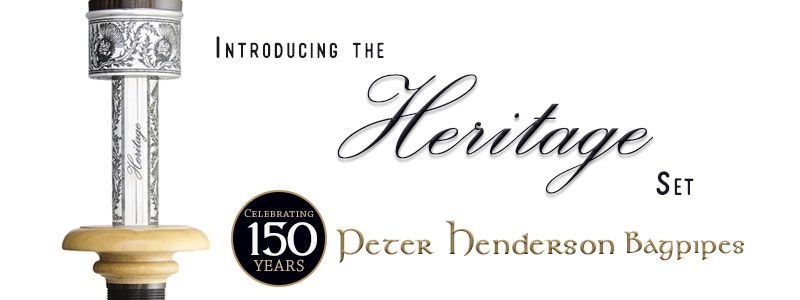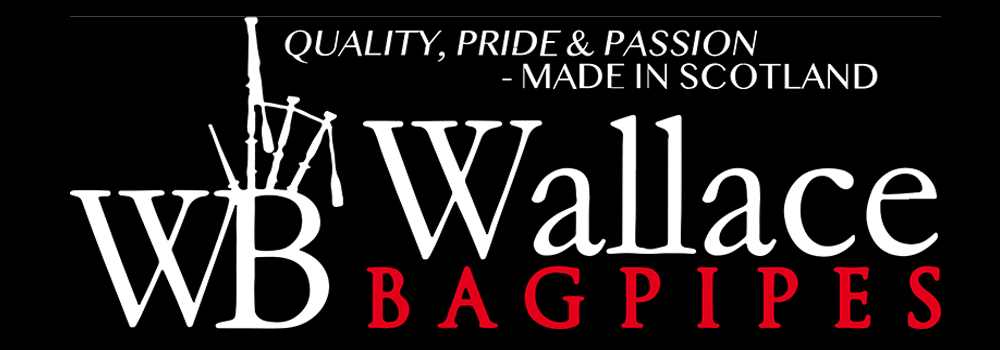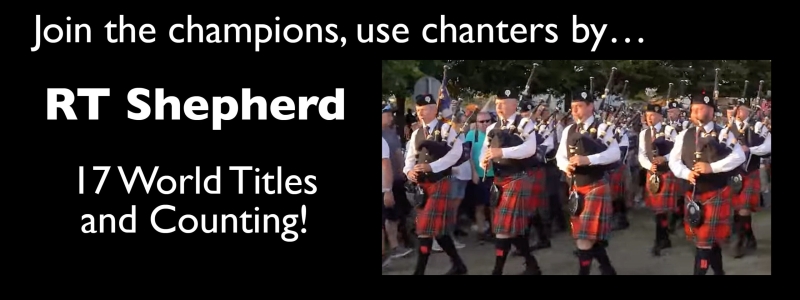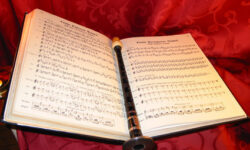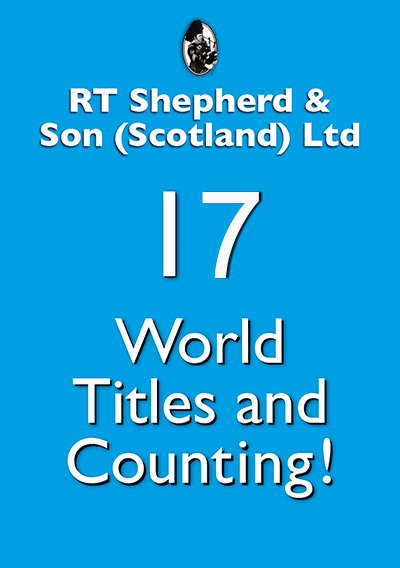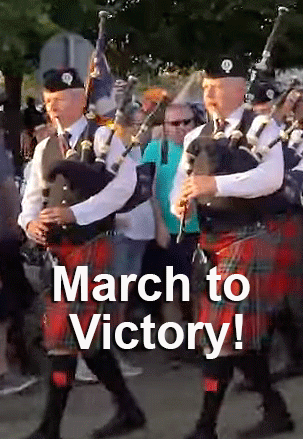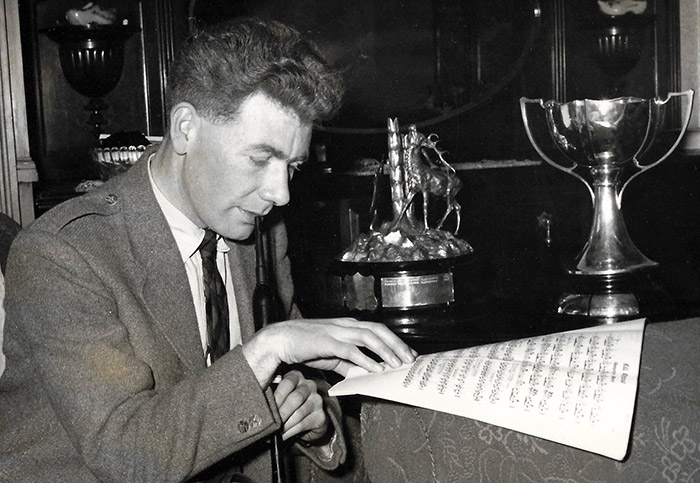
As a young man in his 20s Donald Morrison, South Uist and Aberdeen, was determined to make a name for himself in piping. He communicated by letter with some of the noted individuals of the day. This article is from a letter Sheriff JP Grant, Rothiemurchus, Piobaireachd Society editor and judge, wrote to Donald in 1957. Forthright and instructive, it makes compelling reading ….
Dear Donald, To answer all your questions in full would take a whole book to itself! But I will try and give my opinion on general principles boiled down.
First, and you must take this as entirely confidential between you and me, old Angus Campbell is quite unreliable as to what John MacDonald [Inverness] taught; for example, some years ago at Askernish [South Uist], 2 boys and a girl all made the same grace-note mistakes in the King’s Taxes which Nicol [RB Nicol, Balmoral] had taught them.
Obviously someone had put them wrong since then and I tracked it down to Angus and tackled him about it. He avowed that JM had taught him that way, which I knew he never did.
[wds id=”2″]
I got Angus MacAulay and Donald MacLeod to come over and play on the chanter the bits of the tune concerned, without talking to them about the controversy.
Of course they both played it correctly but Angus still stuck to it. So I told him that I would be seeing old John the next week and would ask him about it and write later. I did this and on John’s orders wrote and told him that he was entirely wrong, telling him off heartily for interfering with other men’s pupils.
So don’t take any statements from Angus as gospel. Secondly, follow anything Brown [RU Brown, Balmoral] teaches you; that is not to say that there are other accepted ways of playing, but if you follow Brown, he is better than any books because it is impossible to write on any staff notation the exact timing.
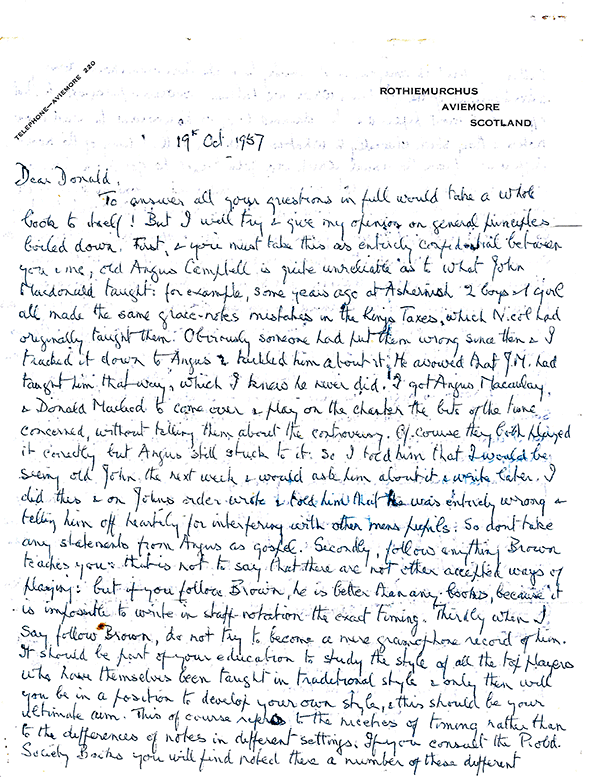
Thirdly when I say follow Brown, do not try to become a mere gramophone record of him. It should be part of your education to study the style of all the top players who have themselves been taught in traditional style, and only then will you be in a position to develop your own style, and this should be your ultimate aim.
This of course refers to the niceties of timing rather than to the differences of notes in different settings. If you consult the Piob. Society Books you will find noted there a number of these different settings of which anyone is at liberty to make their own choice.
Every advertisement of the set tunes which we publish contains a paragraph to that effect, but most pipers are too damned lazy, or too ignorant to read these notes and they stick slavishly to what is printed in full. Many of the note differences from the usual which old John taught he got from Colin and Sandy Cameron and quite a lot of these are confirmed in one or other of the manuscripts which we have collected.
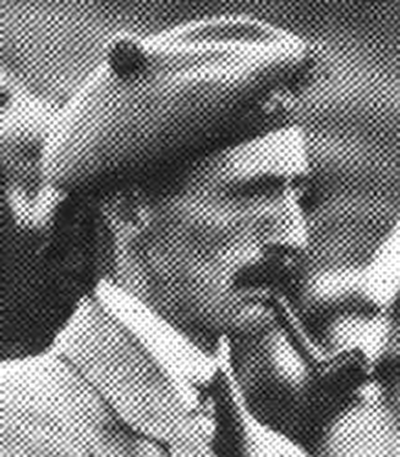
Another point about John’s teaching is this: I first got lessons from him in 1909 and off and on as opportunity occurred later. For the last ten years or so of his life I was with him almost every Thursday learning and listening to him teaching others and I know for a fact that he changed his teaching of some tunes considerably as he was perfectly entitled to do.
Now for the tunes: you are right and Angus is wrong about the As and Gs of the 3rd and 4th bars of line 2 of the ground of the Big Bridge. That is how John taught always. I did not get the Bicker from John but you can take it that Brown is right. Viscount Dundee: I was always taught to sound the F as a short, open melody note and not as a closed gracenote [in the run down from E to low A] but I don’t think anyone would be justified in saying either way is right or wrong. Certainly the open way is much more usual.
I don’t think I heard your Unjust Incarceration at the N. Meeting. If I did I took no notes to remind me. In general I think that you are apt to cut the E of most of your ’cadences’ too short sometimes. I think you are apt to play too slow. There is a lot to learn about pace, but too slow is much more common than too fast and also the relative pace, as between singling and doublings; and still more in singling, eg Dithis, Taorl. & Cruel. Very many men play the melody notes between the cadences at the same pace as they later play the doublings, which is too fast.
I hope that some at least of this screed may help you. We missed you at the Aberdeen competition. I hope you have recovered from the ‘flu which grounded you at home. Yours sincerely, JP Grant.


